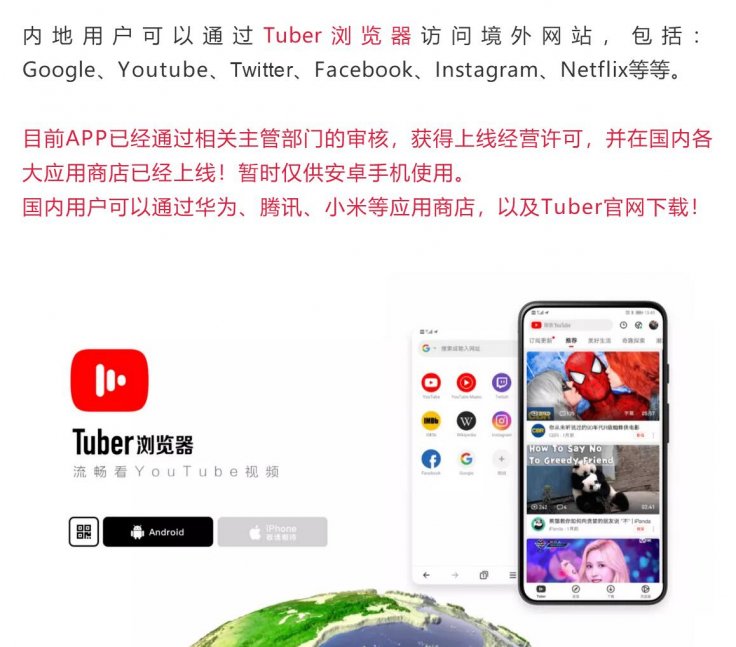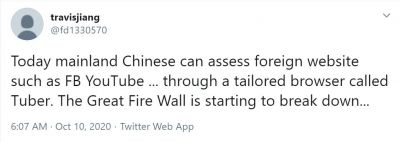China's infamous Great Firewall blocks virtually all access to the world outside the mainland. While VPN (virtual private network) is one solution, it's is not barred from scrutiny. Every VPN providers must be licensed to operate inside China. In addition, they aren't cheap. The minimum price is $5 (33 Chinese yuan). That's the opportunity a developer has seen. Backed by Chinese cybersecurity giant 360 Security Technology (Qihoo 360), a developer has launched a browser that will be able to breach the Great Firewall.
Through the browser, named Tuber, users can get access to previously blocked websites such as Google, Facebook, Instagram, YouTube, Twitter, Netflix, etc. That essentially eliminates the need for a VPN on mobile devices for over 900 million users. Since its launch in late September, the browser has been downloaded over five million times from Huawei's app store with an iOS version is planned.

Chinese Netizens Rejoice
With Chinese authorities regularly cracking down on illegal VPNs that provided unrestricted access to the internet beyond the Great Firewall, Tuber was celebrated by netizens. Some said it was a better alternative than VPNs as it was faster while some welcomed the browser as it could connect the West with China.
Most importantly, using the browser won't attract authorities' attention as long as users comply with China's "seven baselines" that include national interest, public order amongst others. Chinese authorities have punished many people using unauthorized VPNs and have also removed a large number of VPN apps from Google's Play Store and Apple's App Store.






Is It Censored?
Although Tuber offers a faster connection, it is not any different from the licensed VPNs. First of all, the user must register with their phone numbers, national ID or passport to use the browser. That way, users' browsing activity can be tracked. In addition, Facebook, YouTube and Twitter offer censored versions. The content relating to the Tiananmen Square massacre didn't yield any results on YouTube.
Even search query for China President Xi Jinping, Tuber's YouTube version came up with three results, all in Chinese while the English search didn't offer any content at all. All three Chinese videos were from news channels from Shanghai, Tianjin and Macau.
In a way, Tuber is similar to Google's scrapped project Dragonfly. Google designed the search engine that would comply with Beijing's censorship and would need users to register with their phone numbers. But following objections from the human rights activists, the project was shut down.
Yaqiu Wang, a Human Rights Watch researcher, told the South China Morning Post that Tuber was the Chinese government's "fishing mechanism" to punish people. "If it's legit, if the government can monitor what you view and listen to or watch through this VPN, there's a way they can control the situation," she said. "So, I think it could be a possibility that if you log onto those websites that are not allowed, they can later come back to you and punish you for doing that."





Developer's Connection With CCP
More importantly, Qihoo 360 owns 70 percent stakes in the developers of Tuber according to Techcrunch. And Qihoo 360 is owned by Chinese tech billionaire Zhou Hongyi, who is a political adviser to the Chinese Communist Party (CCP). Zhou's two companies were sanctioned by the U.S. Department of Commerce in May, three years after he delisted Qihoo 360 from New York Stock Exchange to align himself with China's national interests as per Bloomberg. Hence, many people weren't sure whether the browser app was actually a result of China opening up to the world.
Despite its success, the browser app has been removed from the Huawei app store. But another browser, sGreenNet which offers similar functionality is still available as per Chinese netizens.









